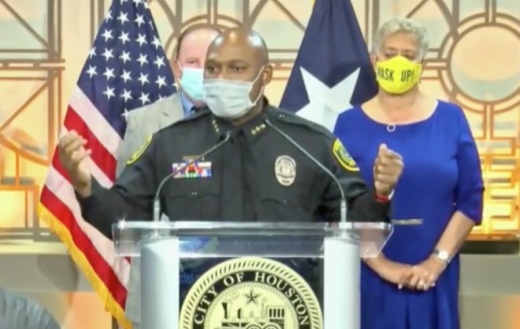Houston City Council unanimously approved Troy Finner's appointment as Houston Chief of Police. Finner's first official day in service will be April 5, the council action notes.
Original post March 23:
Pending approval by Houston City Council on March 24, Troy Finner, Houston Police Department executive assistant chief, will formally transition into his new role as chief of police.
“My goal was to find someone who was fully capable of leading this department from Day 1 who knows the city, its neighborhoods and its people and someone who would work every single day to gain and maintain the trust of our diverse community,” Houston Mayor Sylvester Turner said.
The change, announced March 18, came just days after news of former Chief Art Acevedo’s departure was made public, which has prompted some criminal justice reform advocates, such as Houston Justice organizer Karla Brown, to raise concerns.
“When you think about the magnitude of this decision, it would be best to at least give an opportunity for the community to provide input,” Brown said.
Brown added, however, that Houston Justice supports the choice.
“Just before the winter storm, he was riding around checking on homes, ... and he was out canvassing the homeless encampments,” she said. “I had never seen anyone at his level out there working and making sure people got the resources they need.”
Finner has served in the Houston Police Department since 1990, working in several divisions and ultimately overseeing field support operations and 15 patrol divisions.
Finner said he appreciated Turner looking within the department for Acevedo’s replacement and echoed Turner’s remarks.
“If you are Caucasian, Black—whatever you are, you have your own life experiences. People are different, and I don’t care if it’s their politics or what, you give validation to a person’s experiences,” Finner said.
The department shakeup comes alongside a rise in the city’s homicide rate; Houston saw more than 400 murders in 2020.
Although Turner said Acevedo's announcement was a surprise, he said that with two years left in his final term, he knew there was a possibility Acevedo would leave.
“In this business, I have hired people from other cities, and I’m sure it was a surprise to those mayors,” Turner said. “It happens all the time, and what I will say to people is that everybody is here for a particular season, and no one is here forever.”
At a farewell press conference March 16, Acevedo said he chose to move to Miami, where he will become that city's chief of police, because Mayor Francis Suarez personally recruited him and because it is where Acevedo's family first arrived from Cuba.
Acevedo also downplayed his political future, saying he has no intention of running for office in Texas and that he considers his views ill-suited for Democrats and Republicans. He added that he turned down a position in President Joe Biden’s administration and that he also considered running for L.A. County sheriff before he ultimately chose to continue with policing.
“I love cops, I love being a cop, and I love being on patrol,” he said.
Acevedo also used his farewell address to question bail reform efforts in Harris County, which he attributed to rising homicide rates. In 2017, Harris County began requiring courts to release most misdemeanor defendants prior to trial. Misdemeanors include crimes such as drug possession, trespassing, theft and driving while intoxicated.
“No matter how good the leadership cadre is, you cannot have a criminal justice system that absolutely allows violent criminals to go in one door and out the other,” Acevedo said.
A court-ordered independent study, however, found that the amount of misdemeanor defendants who commit felonies within a year of getting released, about 13% remained stable in the two years leading up to the county’s bail reform efforts and the two years following their implementation. The study has been issued in two installments so far, and further analysis is ongoing.
Finner’s tone differed from Acevedo's when speaking about the justice system.
“When we talk in terms of trust and building relationships, ... it’s just as important in the criminal justice arena, and it’s time everybody takes some responsibility,” Finner said. “It’s time to stop throwing stones and sit down with each other.”
Addressing recommendations from Mayor Turner’s Police Reform Task Force, which the city has fallen behind in implementing under the task force’s suggested timeline, Finner said he and Turner are committed to putting most of the proposals in place.
“We agreed to roll them out, and the mayor is going to call us and order us to roll them out, so we should be seeing something really, really soon here,” Finner said.
When Finner’s appointment was made, Brown said she hoped it represented a change in relations between HPD and advocacy groups.
“We’re alongside them. We’re pounding pavement to try to ensure that justice is certain, people are safe and that our community is not being terrorized by the people who are supposedly there to help them,” she said.





